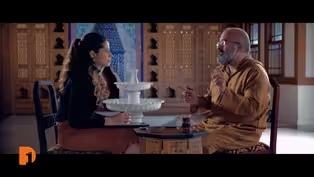
Local independent movie theaters finding new ways to stay open
Clip: Season 10 Episode 8 | 9m 28sVideo has Closed Captions
One Detroit’s Chris Jordan and Bill Kubota visit some of metro Detroit’s remaining movie theaters.
Southeast Michigan has been home to hundreds of movie theaters over the years. Several of them have closed their doors, but some remain open, finding new ways to bring in revenue and keep foot traffic flowing. One Detroit’s Chris Jordan and Bill Kubota visit some of metro Detroit’s remaining movie theaters to learn how independent cinema is surviving in a streaming-centric world.
Problems playing video? | Closed Captioning Feedback
Problems playing video? | Closed Captioning Feedback
One Detroit is a local public television program presented by Detroit PBS

Local independent movie theaters finding new ways to stay open
Clip: Season 10 Episode 8 | 9m 28sVideo has Closed Captions
Southeast Michigan has been home to hundreds of movie theaters over the years. Several of them have closed their doors, but some remain open, finding new ways to bring in revenue and keep foot traffic flowing. One Detroit’s Chris Jordan and Bill Kubota visit some of metro Detroit’s remaining movie theaters to learn how independent cinema is surviving in a streaming-centric world.
Problems playing video? | Closed Captioning Feedback
How to Watch One Detroit
One Detroit is available to stream on pbs.org and the free PBS App, available on iPhone, Apple TV, Android TV, Android smartphones, Amazon Fire TV, Amazon Fire Tablet, Roku, Samsung Smart TV, and Vizio.
Providing Support for PBS.org
Learn Moreabout PBS online sponsorship- [Chris] On Detroit's east side, the nonprofit, Friends of the Alger Theater, has worked to save their idle movie house for decades, which serves as a community billboard.
- We put on our marquee, messages weekly, right?
And we make enough money from that to pay our water bill and our electric bill.
- [Chris] Alger Friend, Jackie Grant, says this movie house formally showed its last feature film nearly 40 years ago.
She found proof up in the projection booth.
- "Friday the 13th, Part 5" in 1985.
It's right there.
- [Chris] They didn't come back and get the reel, huh?
- Apparently not.
- [Chris] The Alger opened in 1935.
In more recent years, the plan, create a community center and maybe show some movies again, but not likely with these projectors.
- We are in my favorite place.
This is the lobby of the Alger Theater.
I know you're thinking, "It's just a mess," but that's changing as we speak.
- Overhead, the lobby's getting a new roof, but there's so much more work to do.
Meanwhile, on Detroit's northwest side, the Redford, one of the few independent movie theaters in southeast Michigan, is also owned by a nonprofit and has been since the late 1970s.
Here I'm meeting film writer and theater volunteer, John Monahan.
The fight always seems to be like how do you get people to come to a theater, instead of staying at home and watching Netflix and?
- That's been a challenge, you know, about what to show.
And certainly our content has changed quite a bit in the last 20 years as our audience has kind of aged out.
- Thank you.
- Nobody is paid at the Redford Theater.
We're all volunteers.
It is a good business model.
The nonprofit business model is very good for a theater like ours, 'cause it's hard to make money in the theater business.
So it takes a lot of pressure off certainly when you don't have a big payroll.
We really do try to create an experience here as much as as we can, going to the movies like you would've in the 1940s or fifties.
And part of that for a lot of us is the ability to show actual film on film, which we do quite regularly on our old late 1950s Newoco projectors that project both 70 millimeter and 35 millimeter with carbon rods like that make a spark between them like they would've used back in the day.
- Is finding the carbon rods and sourcing those like?
- That's a whole, that's a whole nother element.
Yeah, yeah, those, there's only a finite amount of those around and we're always trying to find somebody who's got a stash of them and sometimes when we do find the carbon rods, they're not exactly the right size.
So I've been stockpiling some of those for trades.
You know, maybe we'll find somebody who needs those and has the ones we need.
- [Narrator 4] This is Radio KSIK.
You've been listening to "Music for Old Invalids."
Our next.
- We, of course, we don't just show 35 millimeter, we have real state of the art digital projection, which looks quite good.
As much of a purist as I am on film, we have really, really nice digital projection here too.
- This is the.
When you enter the Redford, you'll encounter some ways it raises money to keep running.
- Often, people will come over here to the counter where Larry the T-shirt guy designs shirts for the different programs.
We have a 50/50 raffle counter over here where folks walk away with maybe a hundred dollars in cash prizes.
Over here is the wall where we're kind of paying tribute to the famous folks that have been through the theater.
Probably most famously, you know, Bruce Campbell from "The Evil Dead."
He was here.
- And one of the reasons why this theater is iconic to a lot of horror fans is this is, of course, where "The Evil Dead" premiered.
- Yeah, we're really proud of that.
Yeah, the fact that both, the first two "Evil Deads" and the short film that, you know, was that they got seed money to make the feature with.
- [Chris] Yeah.
- Also premiered here.
- Right there.
- And we're also really proud that the more recent horror classic, "It Follows," you know, has its opening sequence that was filmed right here in the theater too.
And we're showing that this year for its 10th anniversary.
- What do you hear from other people who run independent theaters in the state?
Do you talk much with other theater owners?
- That's a good question.
I have great interest in the other theaters that are doing similar to what we're doing.
Certainly the Detroit Film Theater, which is still just so wonderful and the Michigan Theater in Ann Arbor and the Penn Theater and what they're doing, which is also, you know, on that volunteer model.
- [Chris] Mm.
- That's a huge success story the way they were able to save that neighborhood theater and you know, and keep that going.
- Then there's the Senate Theater operating in southwest Detroit, complete with an original organ that accompanied silent films just like the Redford.
When you're hearing those stories of other theaters and what they're doing, how many are continuing to make a go of it as a for-profit and how many are kind of embracing the non-profit model that you guys are?
- Yeah, the nonprofit model seems to be pretty predominant.
I mean, look at the profit model certainly didn't work for the Main Art Theater or the Maple Theater.
You know, both of those are gone, which is really sad.
So hopefully, there'll be something that'll take that, something's gotta take the place of those venues.
- The Howell Theater in Livingston County, another old movie house.
A couple of decades ago, it was split into two screens.
It became the Historic Howell Theater when Toledo Native, Tyler Deperro, bought it 10 years ago.
Tell me a bit about the history of the theater.
You said it's 96 years old?
- Yeah, we turned 96 December 11th of this year.
So it was built in 1927.
It opened December 11th, 1928.
It was the first talkie theater of Livingston County.
The first film that played here was called "Show People," directed by King Vidor.
- "Show People," not a talkie, remains a cinema classic.
Were you scared or apprehensive buying like a small town independent movie theater in 2014?
- Yeah, I mean it's a big, like, totally a big risk.
I moved to Howell, moved to Michigan for the theater.
I mean I had done this research, like making a list of like what makes a good downtown, if that's local shops, walkable downtown, different activities throughout the year.
Having people in the community wanting this movie theater space to reopen.
There isn't like a how to operate a movie theater guidebook and like there isn't a website where you can go and find that out.
So this is theater two.
- [Chris] Deperro's finding ways to better engage the community, find revenue streams by hosting weddings, and other things.
- We've had concerts, improv comedy.
We have church here every Sunday.
- Ah, okay.
- In this theater.
The stage, I'd put in 2014, but the original stage that was here like in 1928, that's actually behind the screen here.
Those vaudeville acts had, you know, performed on when the theater first opened.
You can tap dance a little bit or do a little dance or something.
- I don't think I'll do either of those things.
(Chris laughs) Deperro is getting by in this for-profit enterprise by building a following.
Howell has become a destination for independent moviegoers from places like Lansing, Ann Arbor, and Detroit.
Yeah, well I mean that's definitely how I discovered you guys when you were the only theater in Michigan showing "The Babadook" at first.
- [Amelia] Three sharp knocks.
- The Babadook, dook, dook.
- Yeah, yeah, like that, "The Babadook" like after the movie was done, like when audiences kind of come out and they just talk to like other people in the theater about the movie.
Like that's kind of the other rewarding thing about, it's like when I see a movie at like a chain theater, it's like you just like go in and see the movie and you like leave and there's not really any connection or appreciation or discussion after and yeah, so.
- [Chris] While the historic Howell Theater has its community of film enthusiasts, Detroit's historic Alger Theater engages its community, but that has little to do with the movies.
- Right now we are doing Hope applications with the city for property tax exemption.
So we're doing that good work and we've been doing it for a number of years here.
We've probably put, right now into this building, which the public doesn't really know, close to 500, half a million dollars.
It doesn't show because you don't see plumbing outside.
You don't see electrical.
Those are not the sexy items in any of this.
- [Chris] More money needed, "A few million dollars," Grant said, to keep restoring a place to serve the Morningside, East English Village, and Cornerstone Village Neighborhoods.
Volunteers here, like Redford on the other side of town, just trying to hold onto their historic structures by bringing people together.
- Film especially is a real like a social art.
I think it's sad that people are watching "Casablanca" on their phones.
I think to see it in an auditorium, there's nothing like it.
- Oh, you must be kidding.
- So the event kind of is its own reward.
(dramatic music)
Video has Closed Captions
Clip: S10 Ep8 | 1m 43s | Detroiter Abdulrahman Abdinur participates in One Detroit’s “Destination Detroit” series. (1m 43s)
Latina singer and guitarist Eljuri performs in this year’s Concert of Colors
Video has Closed Captions
Clip: S10 Ep8 | 3m 8s | Detroit PBS’ “Best of Concert of Colors” features Ecuador-born singer, songwriter and guitarist Elju (3m 8s)
New documentary “Islam’s Greatest Stories of Love” explores how to heal after losing love
Video has Closed Captions
Clip: S10 Ep8 | 6m 18s | One Detroit’s Chris Jordan spoke to Ariella Gayotto Hohl about making the film (6m 18s)
Things to do around Detroit this weekend: August 22, 2025
Video has Closed Captions
Clip: S10 Ep8 | 1m 49s | The Dragon on the Lake Festival, Novi Taco Fest and other fun events happening around Metro Detroit (1m 49s)
Providing Support for PBS.org
Learn Moreabout PBS online sponsorship
- News and Public Affairs

Top journalists deliver compelling original analysis of the hour's headlines.

- News and Public Affairs

FRONTLINE is investigative journalism that questions, explains and changes our world.












Support for PBS provided by:
One Detroit is a local public television program presented by Detroit PBS



